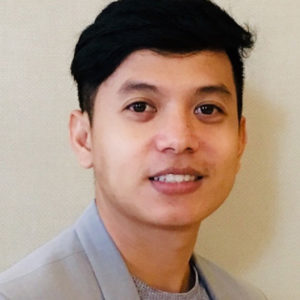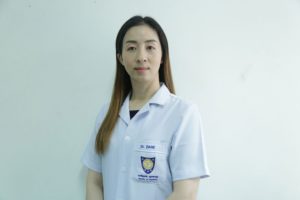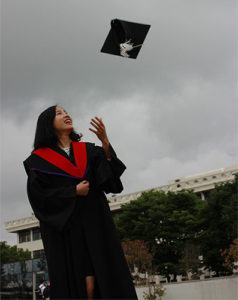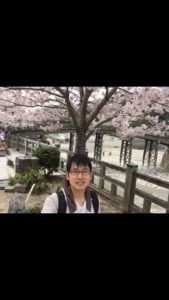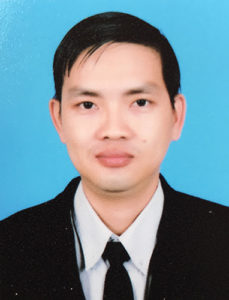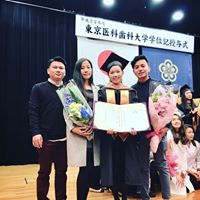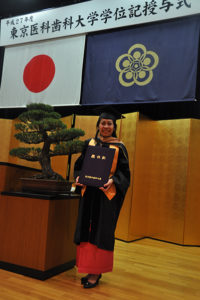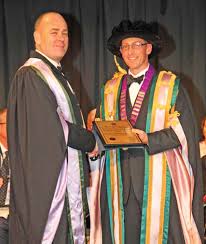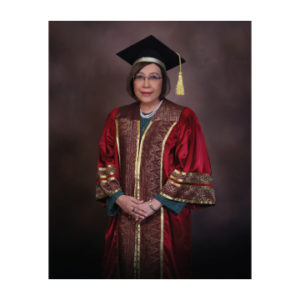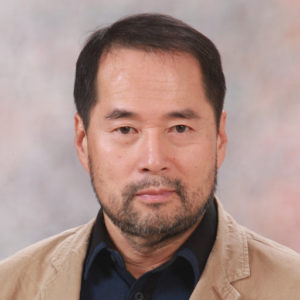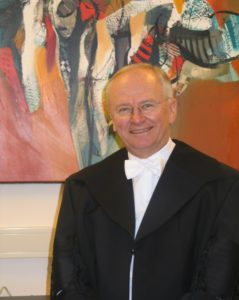Dr. SOEURN Visal
Why should the study of art be a part of higher education? Why should UP students have some experience creating and viewing art? Few, if any, UP students are going to become professional artists. (Although some UP students are talented enough that they probably could pursue a vocation in the arts, if they wished.) In short, art study provides skills that will be necessary to be a successful I.T. or medical professional in the future.
Universities across the globe have come to value arts as a way to develop essential skills that are not always included in typical curricula. This includes prominent institutions such as Harvard Medical School and Columbia University’s College of Physicians and Surgeons. These and other schools see arts as a way to develop critical thinking, creativity, observational skill, and other necessary abilities that a successful professional will require.
At UP, we’re reforming curriculum to include elements of creativity and thinking skill. This school year, all Foundation Year students have an intensive LILT course. While most students simply call it Writing workshops always begin with a “brain storm”.“English Class”, the official term stands for Literacy In Language and Thinking. 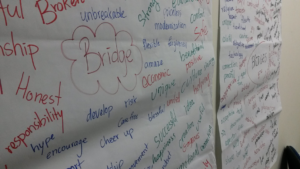 ..LILT was designed and is directed by Writing Through (www.writingthrough.org) founder Sue Guiney. English language skill is of course a strong focus of these classes, but the LILT lecturers are working to add elements of creativity and thinking skill into curriculum. One of the key ways in doing this is through periodic Writing Through workshops, in which students have been writing poems and short stories. In doing this, students are developing their conceptual thinking ability, creativity, and their ability to express themselves (all in English, of course). Foundation Year student Chea Chanvathanak mentioned that the workshop allowed him to accomplish “more that I had expected” in terms of creativity and English use, and that he was proud of his achievements at the end of the week. The workshop week is capped with a speaking performance of students’ works, building confidence and speaking fluency as well.
..LILT was designed and is directed by Writing Through (www.writingthrough.org) founder Sue Guiney. English language skill is of course a strong focus of these classes, but the LILT lecturers are working to add elements of creativity and thinking skill into curriculum. One of the key ways in doing this is through periodic Writing Through workshops, in which students have been writing poems and short stories. In doing this, students are developing their conceptual thinking ability, creativity, and their ability to express themselves (all in English, of course). Foundation Year student Chea Chanvathanak mentioned that the workshop allowed him to accomplish “more that I had expected” in terms of creativity and English use, and that he was proud of his achievements at the end of the week. The workshop week is capped with a speaking performance of students’ works, building confidence and speaking fluency as well.
An optional program, Foundation Year Arts, has been established. UP is lucky to have Ryan Erickson as one of UP-studentour LILT lecturers. Ryan has a background in both art and teaching, and has had his artworks on display at several art exhibitions and galleries in the U.S.A. He has begun leading Foundation Year Arts, a popular weekly session in which students learn artistic skills – drawing, painting, and sculpture. Ryan believes that “art is a way to expand your mind and develop appreciation for things that we’re not used to thinking a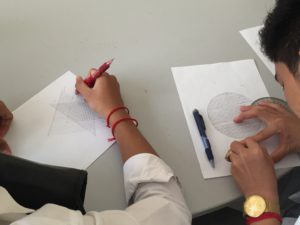 bout.”
bout.”
Creativity is a skill that is continuing to increase in importance. The Future of Jobs report, published by the World Economic Forum, found that employers will deem creativity to be one of the most important vocational skills by 2020 (along with complex problem solving and critical thinking). That same survey, in 2015, found creativity to be only 10th on the list of most important job skills. Thus, creativity is rapidly becoming a critical skill that employers across the world look for.
These global trends exist here in Cambodia. A Cambodia-based publication, Management Insider, has noted that Khmer employers are voicing a strong need for “creative thinking skills, problem-solving skills, or creative and entrepreneurial thinking skills”. Cambodia’s Education Minister Hang Chuon Naron has repeatedly emphasized the need for Cambodia’s education to develop soft skills, including creativity and critical thinking. At UP, we’re working hard to achieve this. It is likely that our students will not become anything greater than novice poets, authors, or artists. However, our strong goal is that our graduating students are outstanding thinkers, innovators, and communicators. A bit of arts education is one way that we can make this happen.
References:
Black, E. (2016, October 28). Cambodia hopes to revolutionise its outdated education system. Retrieved February 07, 2018, from http://sea-globe.com/cambodia-hopes-to-revolutionise-its-outdated-education-system/
Gray, A. (2016, January 19). The 10 skills you need to thrive in the Fourth Industrial Revolution. Retrieved February 07, 2018, from https://www.weforum.org/agenda/2016/01/the-10-skills-you-need-to-thrive-in-the-fourth-industrial-revolution/
Lesser, C. (2017, August 21). Why Med Schools Are Requiring Art Classes. Retrieved February 07, 2018, from https://www.artsy.net/article/artsy-editorial-med-schools-requiring-art-classes
Mousset, E. (2017, June). Expected soft skills in times of hardening competition. Management Insider, pp. 34-37.


